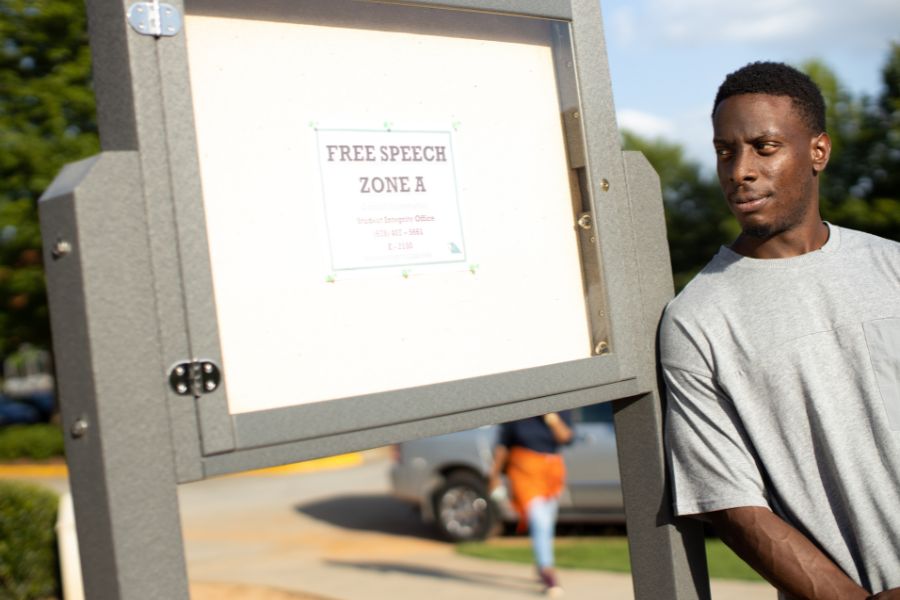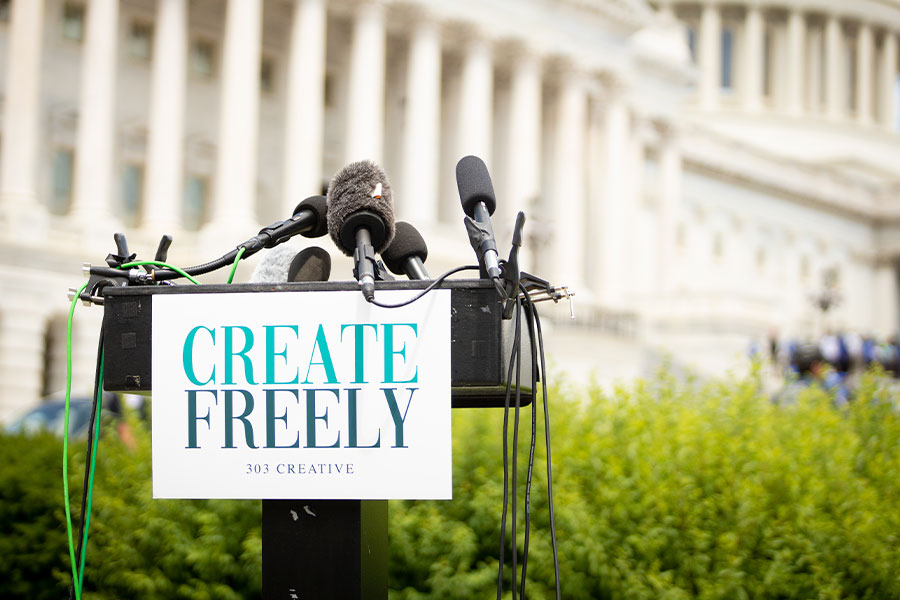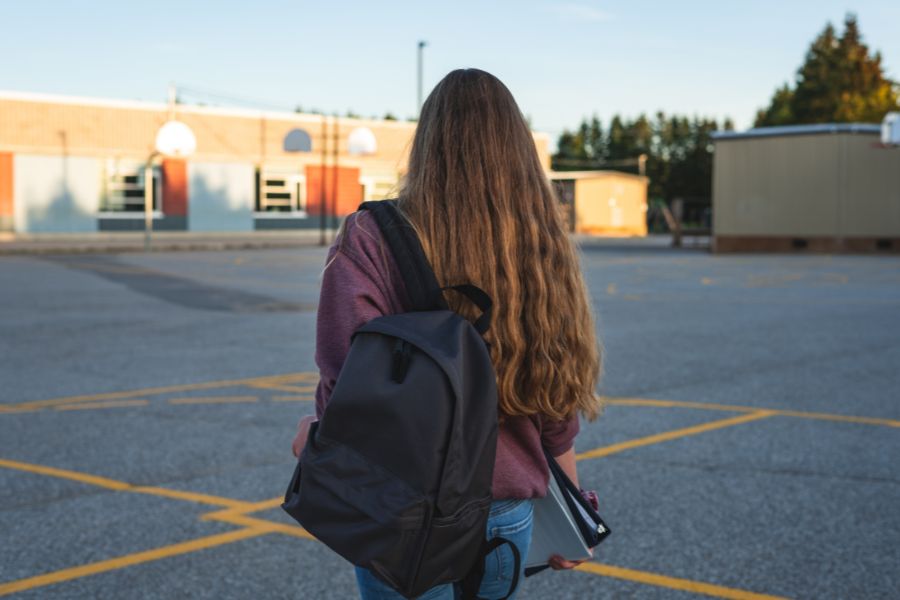
It is the essence of the New Testament, from Jesus’ first words to His first disciples, to the closing lines of Revelation: an invitation to come. Nothing forced, nothing rushed, no pressure… just a gracious extension of earthly hospitality, rife with eternal implications.
For Christians, it’s the most basic of expectations-no one has to be Billy Graham to ask a friend to come to a service, a concert, a Bible study. Even to non-believers, it’s the most harmless, least aggressive expression of faith imaginable: “If you want to come, we’d love to have you.”
That, at least, is how a 10-year-old Pennsylvania schoolgirl named Katie Ayers saw things, tucking invitations to her church’s Christmas party into her book bag before school one December morning. It really didn’t occur to her that anyone else might see them differently.
The party was going to include “ping pong, games, drinks, snacks—all kinds of stuff—and a message about God,” Katie remembers. “I just wanted to bring my friends so they could have fun and so they could learn about God and come to know Him.” Knowing Jesus, and helping others know Him, is never far from Katie’s heart.
“We call her our good, abnormal kid,” her dad, Mike, says. “She loves being her own person and doing her own thing, and she is definitely a leader in her own way.” She’s also “very well-grounded in her faith, and has been, even from a very young age—since she was 4 or 5 years old.” Even that early, Mike says, “you could really see God working through her.”
“One time when she was little,” says her mom, Angela, “she asked us about Santa Claus, if Santa was real. We told her, ‘Katie, why don’t you pray about it, and see?’ And she goes upstairs, and prays, and comes back down, and she says, ‘I talked to God, and He let me know that Santa wasn’t real. And the Easter Bunny isn’t, either.’”
“To be a Christian, to me, means just getting to have a relationship with Jesus,” Katie says, “and getting to know Him better every day, and that I will spend eternity with Him.”
That’s not just a Sunday school recital to Katie. Invited to sleepovers at friends’ houses, she takes her Bible along and reads to the other girls, if they want her to. Early on in school, she began carrying her Bible to the playground at recess, and there, too, some of her fellow students would come over to see what she was reading and listen to a story from the Good Book.
“She witnesses to all of her friends,” her dad says. “She loves God, loves Jesus with all her heart, and she is outspoken about it. She is not ashamed of it.”
“She has such a soft soul,” Angela says. “She wants to save the world.”
So, a few days before the Christmas party, Katie started collecting fliers to give out to her class.
“She made sure she had enough for her whole class, because she didn’t want to leave anybody out,” Mike says. “She was excited to be able to have that opportunity to be able to share her faith, to be able to invite her friends and her classmates to something that she was a part of.”
During homeroom time, Katie says, “we just sit around and, like, talk. So, I brought out my invitations and started handing them out.” Seeing that, her teacher asked if Katie had obtained the necessary permission from the principal. Katie had no idea she needed permission to hand out invitations—none of the children who’d handed out invites to birthday parties and soccer games had ever said anything about getting an okay from the principal. Embarrassed, she gave the teacher a flier to run by the front office. That night, at home, her parents saw that something was bothering their daughter, after all of her excitement about the invitations that morning. They listened with surprise to what she told them.
“She was pretty devastated,” Mike says. But, “I wanted her to be able to handle it in her own way. You let your children lead the path, but sometimes it is tough to not go rescue them. I wanted her to decide how she wanted to pursue this.” Still, he quietly emailed the principal, curious about this previously unheard-of policy. She told him the flier had already been sent on to the district superintendent for approval. A week later, with the day of the party now at hand, the superintendent wrote back to say no, Katie wouldn’t be allowed to hand out the invitations.
“He stated several different policies that really had nothing to do with what Katie was trying to accomplish,” Mike says, “and that was ultimately to share her faith.” Mike pointed out all the other kinds of invitations being handed out in Katie’s classroom. “If they’re allowed to do all that,” he asked, “why is my daughter not allowed to pass out fliers?” The superintendent didn’t really answer that; he just kept citing the policies. The Ayers had to break the news to Katie.
“She cried,” her father remembers. “Here she is, a fifth grader wanting to step out of the box and be obedient to her beliefs and convictions, and when she goes to act on that faith, she’s denied.” Her parents tried to explain that “this is what the Bible talks about, being persecuted for what you believe in,” Mike says. “Because it was truly a persecution against her beliefs and her desire to share with other people.”
“It was tough,” he says. “She just could not understand why other students could hand things out when she couldn’t. We started talking to her, explaining to her what happened, and said, ‘The school has their policies. We do not agree with them.’” Katie would have to find another way.
“I just kind of texted my very close friends and told them about the party,” she says. “That way, it wasn’t during school time. But it was short notice, by then, so they didn’t get to come.”
As days went by, and the disappointment lingered, Mike says, “It was a family decision to start to reach out and see what else we could do about it, because we all just felt bad. There was something not right about it.”
As much as they hurt for Katie, Mike and Angela weren’t going to start any legal action without being sure of her feelings on the matter. “Do you want us to take this to the next level?” they asked. And despite her deeply ingrained desire not to cause trouble, Katie decided that she did.
“It wasn’t right that I wasn’t allowed, just because it was a church Christmas party,” she says. “It wasn’t about an invitation—it was about people coming to meet Jesus, and having fun, and getting to know Him, and changing their lives. My friends had Halloween parties, and [the school] had no questions about it. It wasn’t right.”
“As parents, we wanted to be able to help her … to stand behind her, for her rights, for her religious beliefs,” Mike says. “She wanted that opportunity.
“We started looking around, trying to figure out – who do we even contact?” he says. “I didn’t want to contact just somebody – I wanted somebody who shared our beliefs, who was able to back us up, not only legally, but also spiritually. We found Alliance Defending Freedom – through Google, of all things – and I contacted them and explained what had happened, and they said ‘Absolutely, Katie’s rights have been violated.’ The Ayers’ best option, he suggested, was to sue.
“The attorney explained to us what the process would be, if we decided to go through with a lawsuit,” Mike remembers. “He told us to pray about it, think about it, discuss it with Katie, and make sure we wanted to pursue this. So we got off the phone, sat down at dinner, discussed it, prayed about it, and really just felt that the Lord was leading us in that direction … to go into the lawsuit process.” Still, there were doubts.
“I was kind of unnerved, to be honest,” Angela says. “My first instinct is to be Mother Bear, and I was really scared for my daughter … what she was going to face with her classmates, with her teachers, with the principal. I was just really worried about how it would affect her.”
“Then, through prayer, and all of us talking, getting together, seeing how excited she was about it, we really gained insight and peace for the whole thing.” Best of all, Angela says, was the transformation in Katie, “seeing her faith re-lit on this, [realizing] that we could make a difference.”
“I was excited that there was a chance I was going to be able to hand stuff out,” Katie says. “But I was also nervous. We had never [been in] a lawsuit before, so I didn’t know how that would go. But we just trusted in the Lord. We prayed, and I just got a peace about it.” Their decision would ultimately impact not only Katie’s classroom, but schools throughout America.
“This was a difficult case, but an extremely important one,” says David Cortman, Alliance Defending Freedom Senior Counsel, “because younger students are continually influenced, and indoctrinated, by what is taught at school. And they should have the right to be able to not only respond, but to hold and share their personal views. It’s important for children like Katie to be able to take a stand for their values and faith beliefs.”
“The way the law has developed, the older you are, the more protection you receive under the First Amendment. But there’s nothing in the Constitution that limits that protection to any certain age. Even younger students are protected by the Free Speech Clause of the First Amendment.
“You get pushback,” he says, “from people who would try to claim that students are not at school to practice their First Amendment rights, or to engage in free speech—they’re at school to learn. Katie’s own school district made the incredible claim that younger students have few—if any—First Amendment rights at all while at school … which is remarkable, given the fact that the Supreme Court has said for years that students don’t shed their free speech rights at the schoolhouse gate.”
That’s why, Cortman says, “We’ve litigated at least a half dozen of these cases throughout the country over the last several years—because we think it’s important that students’ free speech rights are protected, even at the younger ages.
“If you teach a student at a young age that either her faith is illegal or unconstitutional in school, then she’s learning a lesson that she’s going to carry with her for the rest of her life. But if you teach her that it’s not only constitutional, but right for her to be able to share her faith with other students … then she’ll carry that with her for the rest of her life.”
Their involvement in a federal lawsuit brought several surprises for the Ayers. One was the decidedly mixed reaction from family and friends—many of whom were very supportive, some of whom were not. Another was the overwhelming media attention that came with the case.
“Our phone started ringing, the local newspapers, the TV station,” Mike says. “We weren’t expecting that. Fox News actually picked up on the story, and it was one of their headline stories. There were comments … many of them very negative. Just very nasty things.” Somehow, none of that intruded on Katie’s school life.
“None of my friends made fun of me,” she says. “A couple actually helped me go through it, and supported me. And the teachers didn’t say anything about it, so that was good.”
That lack of drama at school became even more important as the family found itself facing a new personal crisis: Angela was increasingly being sidelined by physical pain and other disturbing symptoms. Tests had her doctors concerned that she might be suffering from multiple sclerosis.
“It was very scary,” Angela says, “and devastating for all of us. But we knew God had plans, and there was a reason we were going through the things that we were.”
“It was a huge roller coaster during that time,” Mike remembers, “almost to a point that we just wanted to say, ‘You know what? Let’s just forget about this lawsuit and start focusing on what’s going on with the health issues and things like that.’ Because you start to lose sight of what the true calling is. The enemy will try anything to get you away from what God’s called you to do.
“There were times when we would just sit down and pray, all of us, for God to give us the strength to make it through,” he says. “It was a long process, and we had to rely on God, because He brought us here. He put that on my daughter’s heart to pass out the fliers, to share her faith. If He brought us to this point there is a reason, so we just had to keep that stamina, keep that faith, continue to pray and seek Him. It was a growing experience, a bonding experience.”
At one of the court hearings during the case, the Ayers came face-to-face with the school district officials and their attorney. Amid the awkward greetings, the opposing counsel reached out to shake Katie’s hand.
“So,” he said. “Here’s our little troublemaker.”
He didn’t say it kindly, but Katie took the comment in stride.
“She responded to that much better than the thoughts that went through my mind,” Cortman says. “With a cute little smile, and a giggle, she said, ‘That’s right, that’s me.’”
Katie’s giggle turned out to be the last laugh. A district court found that the policies cited by the Pocono Mountain School District in silencing her speech were unconstitutional. The school district appealed that decision to the U.S. Court of Appeals, which upheld the lower court’s ruling “and laid out some fairly important principles,” Cortman says. Among them: 1) elementary students do have rights of free speech, and 2) district officials had no right to silence Katie’s speech simply because they disagreed with it. The Court of Appeals is the second-highest court in the country—and this was only the second Court of Appeals ruling to affirm First Amendment protections of the religious speech of elementary students.
“It’s not only a great victory in an important case,” Cortman says, “but it will have a broader reach as time goes on.” The Pocono policies are statewide, he points out, in a state with over 500 school districts, and nearly 2 million students attending. “We’re going to take Katie’s victory, do research on every one of those school districts, and send a legal demand letter to every one that has a similar unconstitutional policy, demanding they change those policies.
“After that,” he says, “we will be doing the same thing in the entire 3rd Circuit, which includes several district courts, several surrounding states … and then beyond that to states outside the 3rd Circuit. So the impact of this victory is going to be tremendous.”
It was just one of those things that make you want to do a happy dance, you know?” Mike says, remembering the day they learned they’d won the lawsuit. “It was cool, it was awesome … it was a sigh of relief. ‘We won! You won, Katie—you did this!’ It was just pure excitement for the entire family, and for what God can do.”
“Working with Alliance Defending Freedom was amazing,” says Angela (whose symptoms have since been diagnosed as fibromyalgia). “They were so wonderful … friendly and down-to-earth. We’d never been through anything like that, and they made us feel comfortable, and relaxed, and made Katie feel so good for stepping out and believing that God had a plan for this.”
“It was just a whole new experience, and I learned from it,” Katie, now 14, says. “It was scary, sometimes, not knowing what was going to happen, so I just prayed … and God was always there. He just gave me peace and helped me all the way through.”
One person can make a difference,” Cortman says. “Katie, by deciding to take a stand, and being supported by her family and Alliance Defending Freedom, could influence millions of students.”
For Katie, it’s enough to know she influenced one. Soon after the legal win, her church held another event. This time, she handed out fliers to everyone—and nobody said a thing. Some of her classmates came, too … including a girl Katie had been inviting for a long, long time.
At the church event, the girl accepted Christ as her Savior. Soon after, her family started coming to church with her. Now, some of them are Christians, too.
The “little troublemaker” believes those decisions were more than worth all the trouble of the last few years.
Just ask her.




